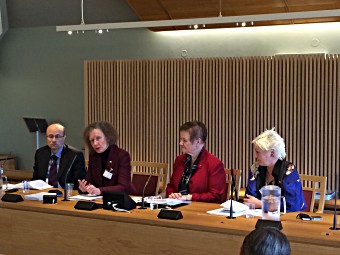
In the photo (from left to right): Hans Brattskar, State Secretary, Norwegian Ministry of Foreign Affairs; Helen Evans, DCEO, GAVI Alliance; Sylvi Graham, Member of Parliament, Conservative Party; Anne Lise Ryel, Secretary General, Norwegian Cancer Society.
Credit: GAVI/2014.
Oslo, 17 March 2014 - GAVI Alliance Deputy CEO Helen Evans joined a chorus of senior Norwegian politicians this week to help raise the alarm on the “silent killer” of women and girls in poor countries – cervical cancer.
Addressing the disease’s deadly burden at a seminar organised by the Norwegian Cancer Society and hosted by the conservative party, Ms Evans explained that the GAVI Alliance helps developing countries fund the introduction of the human papillomavirus (HPV) vaccine, protecting women and girls against the leading cause of cervical cancer.
“Cervical cancer is preventable – we have the technology,” said Ms Evans in her statement. More than a quarter of a million women die every year from cervical cancer, the overwhelming majority of them in developing countries.
“Cervical cancer is a silent killer as it touches women in the world’s poorest countries,” said Anne Lise Ryel, Secretary General of the Norwegian Cancer Society, “I don’t want it to be silent anymore.”
Effective prevention
Without changes in prevention and control, it is estimated that the disease will claim more than 400’000 lives annually by 2035, with over 95% expected to be women living in poor countries. Women in developing countries often lack access to cervical cancer screening and treatment, making the HPV vaccine the best prevention tool against the disease.
Cervical cancer is preventable – we have the technology
GAVI Alliance Deputy CEO Helen Evans
On World Cancer Day (4 February), the GAVI Alliance announced that an estimated 206,000 girls will benefit from the Alliance’s recent decision to support targeted demonstration projects to introduce HPV vaccine in 10 developing countries. These approvals bring the total number of countries lined up to receive GAVI support for HPV vaccine to 21.
Approximately 50 participants, including Members of Parliament and representatives from the research community, civil society organisations and embassies, participated in the seminar, which was hosted by the Conservative Party at the Norwegian Parliament.
Discussions focused on the global burden of cervical cancer, its impact on global health and international development, and the importance of HPV vaccines in low- and middle-income countries.
Hans Brattskar, State Secretary at the Norwegian Ministry of Foreign Affairs emphasised the importance of the GAVI Alliance’s public-private sector model to promoting sustainable development and noted that “GAVI is an example of a global partnership that works.”
Norway is among the original six GAVI Alliance donor countries, and has remained a strong supporter of the Alliance, both politically and financially, since its foundation in 2000. For the period 2011-2015, Norway accounts for approximately 10% of the Alliance’s total funding.
